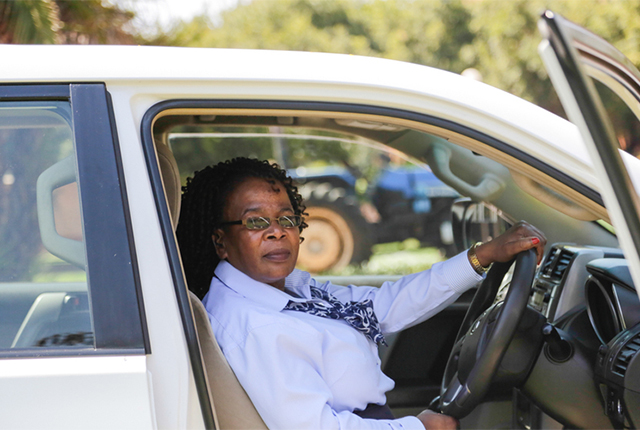Zim woman rolls wheels at UN agencies

Lloyd Gumbo : Features Correspondent
Breaking down barriers, particularly imagined ones, is no easy feat. It takes courage and determination never to allow surroundings to define who one should be. Neither should one allow perceptions and beliefs to define their future. These are the guiding principles of 62-year old Ms Aggipher Rukawo who etched her name into the United Nations history 23 years ago when she became one of the first female drivers under the UN system the world over.In fact, someone once said professional female drivers are like ghosts or aliens, you hear about them but rarely or never do you get to see them.
Worldwide, driving as a profession is a male-dominated field despite the fact that an equal number of women, if not more, actually have driver’s licences, mainly used to drive personal or company cars.
Just like other women, when Ms Rukawo got her driver’s licence in 1983, it was mainly for driving her family.
She had been a house wife since she got married in 1972.
Doors started opening for her 10 years after she obtained the driver’s licence.
But a giant leap of faith resulted in her shattering glass ceilings in a field that was predominantly male and she has no regrets about it.
“In 1993, a vacancy arose at the World Bank for a personal driver of the head of the bank,” said Ms Rukawo. “I tried my luck and got the job,” she said.
“But I did not stay long because another opportunity arose at the United Nations High Commission for Refugees (UNHCR) where I got a job as a driver again. I was transporting refugees from Zimbabwe to Mozambique during the repatriation exercise.
“In fact, I was the first female driver under the UN system in Zimbabwe, and probably also among the first female UN drivers the world over.”
After the repatriation exercise ended in 1996, Ms Rukawo joined another UN agency, the United Nations Country Support Team until 2008 when it relocated to South Africa.
She was to then join the United Nations Development Programme where she is serving as transport assistant and driver.
As part of her duties, she drives around Zimbabwe including Victoria Falls, which is about 900km from Harare, yet she has been there on several occasions without stop-overs.
The job is exciting and immensely satisfying, said the mother of five and grandmother of seven.
“I wish other women out there who have driver’s licences also applied for these jobs when posts are advertised.
“I have been working under the UN for the past 23 years and there is not a single day that I felt my gender let me down. What is important is for people to see themselves as human beings first before they look at their biological make-up,” said Ms Rukawo with confidence.
All the other drivers at UN agencies in Harare, such as the International Labour Organisation (ILO), the United Nations Population Fund (UNFPA), UN Women, United Nations Programme on HIV/Aids (UNAIDS) and UNHCR joined well after her.
And for the 23 years she has been driving for the UN she has no regrets about the choice she made.
She believes women can play a major role in fending for their families as long as they do not feel sorry for themselves and think they are inferior to men.
But how did Ms Rukawo make it into UN system particularly for a job that is considered a preserve of men?
UNDP country director, Ms Verity Nyagah said the agency encouraged women to apply for any kind of job they qualify for as it does not discriminate on grounds of gender.
She said women employed by the UN agency earned their positions as the organisation’s recruitment was competitive and that it took courage, determination and discipline to succeed.
“UNDP at both the global and Zimbabwe country level is influenced by the corporate Gender Parity Strategy 2013- 2017 and the Gender Equality Strategy 2014-2017,” said Ms Nyagah.
“The Gender Parity Strategy is influenced by the thinking that ‘No organisation can achieve its full potential where women are left behind or are left out’.
“The main goal is to have equal representation of both female and male employees at all levels, especially at managerial levels.”
But it is rare that women are given a chance for jobs that are considered labour intensive and oftentimes, they are shut out.
In fact, Ms Nyagah gives of the reasons some women do not bother applying for such jobs.
“There are barriers like gender discrimination and perceptions that categorize jobs such as driving as traditionally a man’s job.
“The duties of a driver involve travelling outside Harare for several days regularly and most women find it difficult to be away from their families especially when the children are young. Some of our projects are in very remote areas and women find such places uncomfortable,” she said.
Ms Nyagah hailed Zimbabwe for its women empowerment policies, among them the new Constitution and the National Gender Policy.
She said the country had gender parity at primary level and programmes to encourage the uptake of sciences and mathematics amongst girls.
“This is a very good foundation of preparing women’s representation in male dominated areas. As a result of the constitutional gains, women’s representation in Parliament rose from 16 percent in 2008 to 34 percent in 2013.
“The country can also take advantage of the alignment of laws and policies to the Constitution to ensure that gender equality and women empowerment issues are addressed.
“The Sustainable Development Goals, in particular Goal Five, instructively provides yet another opportunity for the country to scale up efforts to achieve gender equality and women empowerment,” she said.
Feedback: [email protected]








Comments